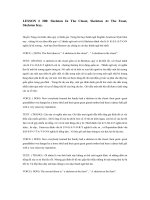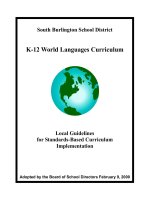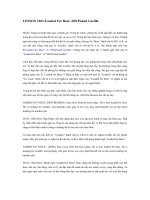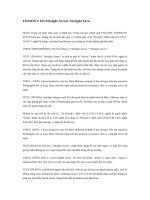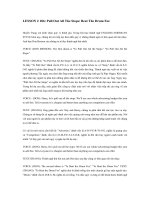Tài liệu Part 12- Britain pptx
Bạn đang xem bản rút gọn của tài liệu. Xem và tải ngay bản đầy đủ của tài liệu tại đây (1.25 MB, 8 trang )
I I 2 I I The law
for th
em
to be dismissed . The
onl
y way that this can be d
one
is by a
resolution of
both
Houses
of
Parliament, and this is something that
has never happened. Moreover, their retiring age is later than in
mo
st
other occupations. They also get very high salaries. These things are
consi
dere
d necessary in order to ensure their independe nce from
interference, by the stare or any other party. However, the result
of
their background and their absolute security in their jobs is that,
although they are often people
of
great l
earning
a
nd
intelligence.
so
me
judges
app
ear to have difficulty
und
er
standing
the
problem
s
and
circumstances
of
ordinary
peop
le, and to be out
of
step wi th
general
public
opini
on . The
judg
em ents
and
opinions that t
hey
give
in court sometimes make the headlines because they are so spectacu-
larly
out
of
date. (The inability
of
som
e of them to comprehend the
mea
ning
of
racial equality is one
examp
le. A senior Old Bailey judge
in the I
980s
once r
ef
erred to black
peo
ple as 'nig-nogs' and to some
Asians involved in a case as 'murderous
Sikhs")
QUES
TIONS
I The
publi
c perc
eption
of British police officers
has cha
nge
d over the last thirty years. In
what
ways has it changed ,
and
wh
y do you think
this is?
2 It is
one
of
the principles of the British legal
system
that you are innocent until proven
guilty. However, miscarriages of justice do
occur.
How
did the
one
s described in this
chapter come about ?
3
Wh
at are the
main
diff
eren
ces b
etween
the legal
system in you r country and that in Britain?Is
there anyth
ing
like
the
'right
to silence" Are
there any unpaid
'amate
ur' legal officers similar
to Justices of the Peace?
Wha
t kind of training
do lawyers
und
ergo
?Com pared with the
system
in you rcountry, what do you see as the
strengths and weaknesses of the British system?
SUGGES
TI
ONS
4 British people believe that there is more crime
in Britain than there used
to
be. What reasons
could there be for this? Is it tru e' Do you think
of Britain
as a 'safe' or 'dangerous' place? What
about your
own
country - has crime increased
there, or do
peop
le think that it has'
5 Many people in Britain argue that impris
onm
ent
is an ineffective and expensive form of punish-
ment. Do you agree with this view? What
alternative forms of punishment in use in
Britain or in your country do you think are
bett er,
if
any'
• There are many contemporary British writers
who
concentrate on
the
theme
of crime and detection, among them Colin Dexter,
who
se
book
s (
such
as TheDead afjericho, Last
Bu
s to
Waodstoc
k and The
Wench
is
De
od) fea
tur
e Inspec
tor
Morse. (Many of them have been adapted for
television.) P DJames and R
uth
R
end
ell are two other highly
respected wri ters
of
crime fiction.
Please purchase PDF Split-Merge on www.verypdf.com to remove this watermark.
12
International relations
The relationship
between
any c
ou
ntry and the rest
of
the
worl
d can
reveal a great deal
abou
t that co
unt
ry.
The end
of
e
mpi
re
The map
below
shows the British e
mp
ire in
19
I 9, at the time
of
its
greatest extent.
By this ti
me,
however, it was alread y beco
ming
less
of an empire and
1110
re
of a
con
federa
tion
. At the sa
me
international
conference at
whic
h Britain ac
quir
ed new possession s (fo
rmerly
German) under the Treaty of Versailles, Australia, Ca
nad
a, New
Zealand and South Africa were all repres
ent
ed se
par
ately
from
Britain.
The real dismantling
of
the em pire took place in the twenty-five
years following the Second World War
and
with the loss
of
emp
ire
went a loss
of
power a
nd
status. These days, Britain's a
rm
ed forces
can no longer act unilaterally, wi t
hout
reference to the international
communi ty. Two eve
nts
illustrate this. First, Suez. In 1956, Egypt.
without prior
agreement,
took
over
the Suez canal from the interna-
tional comp
any
ow
ne
d by Britain and France. British
and
French
I I J
• £ <rio<
_
~
T
~
o
Lf-
"I'
~
_
-:-
__
._
]000
(at the Equafor)
©
Oxford
University
Press
°Tnm." do Cu"" .
The British Empire
In
1919
~
.:
,
~
ze, "
tv
Please purchase PDF Split-Merge on www.verypdf.com to remove this watermark.
[ 14 12International relations
Th
eo
pe
ning
cere
mo
nyof
the
C
om
-
monw
eal
th Games in 1994. This
ath
let
ics
cont
est
is
hel
d
every
four
ye
ars.
The
Co
mmo
n
we
alth
The dismantling
of
the British
empire took place comparatively
peacefully, so [hat
good
relations
between Britain and the newly inde-
pendent
countries
were
established.
As a result.
and
with the encourage-
ment
of
Queen Elizabeth II, an
international organization called the
Commonwealth.
composed of the
countries that used to be
pan
of
the
empire, has
continued
to hold
annual meetings. Some countries in
the
Commonwea
lth have even kept
the British monarch as head of state .
There are no formal eco
nom
ic or
poli tical advantages involved in
belonging to the Com
monwea
lth,
but it has helped to keep cultural
contacts alive, and does at least mean
that every year the leaders
of
a sixth
of
the
wor
ld's population sit
down
and talk together. Until quite
recently it did have
economic
impo
rtance,
with
special trading
agreements
between
members. But
since Britain became a full me
mber
of
the EEC. all but a few of these
agreements have gradually been dis-
continued.
military action to stop this was a dipl
om
atic disaster. The USA did
not support
them
and their troops were forced to w
ithd
raw. Second,
C
ypr
us. W
hen
this co
unt
ry left the British
empire,
Britain beca
me
one
of
the guara
nto
rs
of
its independence from any ot
her
coun try.
However, when Turkey invaded the island in
1974
, British mili tary
activity was restricted to airlifting the pers
onn
el of its military base
there to safety.
After the Seco
nd
World War and
throughou
t the 1950s, it was
un derstood that a conference of the
wo
rld's great
powe
rs involved
the USA, the Soviet Union and Britain. However, in 1962, the Cuban
missile crisis,
on
e of the grea tesl lhreats to global peace since the
war, was resolved witho ut reference to Britain. By the
J
970S
it was
g
ene
rally accepted that a 'su
per
power'
con ference involved only the
USA and the Soviet Union.
Despite Britain's loss
of
po
wer
and
status
on
the
wo
rld stage, so
me
small
remn
ants of the empire remain. Whatever their racial
or
igins,
the inhabitants of Gibraltar, St Helena, the Ascension Isl
and
s, the
Falkland
s/Malv
inas and Belize have all wis
hed
to
cont
inue wi th the
im
per
ial arrangement (they are afraid of being swallowed up by their
nearest
neighb
ours). For British gove r
nments,
on the
on
e ha
nd
this
is a source
of
pri
de, but on the other hand it causes
embar
rassment
and irri tation: pride, because it suggests
how
beneficial the British
im per ial administration
mu
st have been;
em
barrassment, because
the possess
ion
of colonial territories does not fit with the image of a
modern
de
mo
cratic state; and irritati
on
because it costs the British
taxpayer
mone
y.
The old imperialspiritis not quitedead. In 1982 the British gov
ern
-
ment spent
hun
dreds of millions
of
p
ound
s to recapture the
Falkland
s/Mal
vinas Islands from the invading Argentinians. We
cannot k
now
if it would have done so
if
the inhabitants had
no
t been
in favour
of
remaining British a
nd
if Argentina
had
not had a military
dictatorship at the tim e. But
wha
t we do know is that the gove
rn-
ment 's action received enor
mo
us popular su
ppo
rt at home. Before
the 'Falklands War', opinion polls
showe
d that the govern
ment
was
extremely un
po
pular; afte
rwar
ds , it su
dde
nly beca
me
extremely
popular a
nd
easily
wo
n the general election early in the foll
ow
ing
year.
Please purchase PDF Split-Merge on www.verypdf.com to remove this watermark.
The armed f
or
ces
The loyalty
of
the leaders
of
the British a
rmed
forces
to
the
govern
-
ment has no t been in
doub
t since the Civil War
(w
ith t
he
possible
exception
of
a few years at
the
beg in
ning
of
the tw
ent
ieth cent
ury-
see chapter 2). In
add
ition,
and
wit
h the
excep
tion
ofNonher
n
Ireland, the arm y has
on
ly rarely
been
used to keep order wi thin
Great Britain in the last 10 0 years.
'National Service' (a period of com
pu
lsory m ilitary service for all
men) was
abo
lished in 1957. It had never been very popular. It was
contrary to the tradi ti
on
al view tha t Britain should not have a large
standing
arm
y in peacet
ime
. Mo
reo
ver, the end of
em
pire,
tog
et
her
with the increasing mec hanization of the military, me ant that it was
more i
mpo
rtant
lO
have small,
prof
essional forces staffed by spec ial-
ists. The
mos
t obviously specialist area of the m
od
ern military is
nuclear weapons. Since the
19
50S
, the Ca
mpa
ign for Nuclear Dis-
armament
(CND)
has
argue
d,
on
both
mo
ral and econo m ic
gro
und
s,
that Britain
should
cease
to
be a nuclear power. At certain peri
od
s
the CND has had a lot
of
popu
lar
sup
port
(
e-
Gre
en
horn
Com
mo
n).
However, this
support
has not been co nsistent. Britain still has a
nuclear force, although it is
tin
y co
mpa
red
to
that of the USA.
The end of the
'Co
ld War' bet
ween
the
wes
t and t
he
Soviet
Unio
n
at the
end
of
I
9805
caused the British gover
mnen
t to look for the
'peace dividend' and to reduce furt
her
the size of the
arm
ed forces.
This caused protest fr
om
politic
ian
s
and
military professionals
who
were afraid that Britain w
oul
d
I1Ql
be able to meet its 'commi t
men
ts'
in the world. These com m itments,
of
course, arc now mostly on
behalf of the U
nit
ed Nat
ions
or the E
urop
ean Union. T
here
is still a
feeling in Britain that the country s
ho
uld be able to make significant
contributions
to
inte
rna t
ion
al peacekeeping efforts. The re
duc
tion
also caused bad feeling w ithin sections
of
the a
rme
d forces them -
selves. Its three branches
(the
Ar
my
, the Royal Navy a
nd
the Royal
Air Force) have dis tinct trad
ition
s
and
hist
ori
es thai it was felt
we
re
being threate ned. The a
rmy
in particular was
unh
app
y
wh
en several
famous old regim
ent
s, each wi th their ow n distinct traditi
on
s,
were
forced to
mer
ge with
othe
rs. At one tim e, a nu
mb
er
of
up
per
-m
iddl e
classfamilies maintained a tradi tion down the generations
of
belonging
to
a particular r
egim
ent. Few er
and
fewe r such families
exist today, However, a career in the arme d f
or
ces is still highly
respectable. In fact, Britai
n'
s
arm
ed forces arc one of the few instit u-
tions that its people admit to being proud of.
Transatlantic relations
Since the Second Worl d War, British governme nts have often r
ef
erred
to the 'special relationship ' whic h exists between Britain
and
the
USA.
There have been occasional l
ow
point
s.
such
as Suez (see above)
and when the USA invaded t
he
Caribbean island of Grenada (a
member
of
the British Co
mmo
nwe
alt
h).
But generally speaking it
The armed forces J I 5
T he se nio r
serv
ice
This is a phrase
some
times used
to
describe the Royal Navy. It was the
first
of
the three armed f
or
ces
to
be
established. Traditionally. it traces
its history ng ht back to K
ing
A
lf
red
(see cha
pter
2).
Greenham
Common
Greenham
Comm
on is the Royal Air
Force base in Berkshire wh ich
became the focus for ant i-nuclear
campaigners (mainly
wo
men
) in
the
[980s.
American Cruise nuclear
missiles
were
based there
from
[983 to 1991.
Prot
est
orsat Gre
enh
ornCom
mon
Please purchase PDF Split-Merge on www.verypdf.com to remove this watermark.
I I 6 12 International relations
Is Br
ita
in
really
part
of
Euro
pe?
The government says it is, but look
at this report from
The
Sunday
Times
of
18 April 1993.
Britain bans EC medals
British members
of
the European
Commun
ity monitoring mission in
former Yugoslavia have been
banned from a formal presentation
of
medals struck by the Ee to honour
their bravery.
The British monitors have been
told that they may only receive the
medals privately and keep them as
mementoes. They must never wear
them on their uniforms because
of
government rules against the
acceptance
of
decorations from
'foreign powers'.
. Many are angered by the
decision
(Q
count the EC as a
foreign
power
.
has persisted. It survived t
he
Falklands War,
when
the USA offered
Britain im portant material help , but little
pub
lic su
pport,
and
regained its stre
ngt
h in ' 99 I
dur
ing the
Gulf
War against Iraq, when
Britain gave
mo
re active
mat
erial
sup
por
t to the Americans than any
other Eur
op
ean
coun
try.
Public feeling
abo
ut the relati
on
ship is a
mbiguo
us.
On
the
one
hand
, it is reassuring to be so diplo
mat
ically close to the most power-
ful na
tion
in the
world,
and the shared language gives people some
sense
of
bro
th
erh
ood wi th A
meric
ans.
On
the
other
hand
, t
here
is
mild
bitterness about the
sheer
power of the USA.
The
re is no distrust,
but r
em
arks are
of
ten
mad
e
abo
ut Britain being
nothi
ng m
or
e than
the fifty-first state of t
he
USA. Similarly, while some ol
der
people
r
em
em ber
wit
h gratit ude the Americans
who
came to their aid in
two
world wars,
ot
hers resent the fact that it t
oo
k
them
so long to
get involved!
In any case, the special relationship has inevitably
declined
in
significance since Britain joined the E
urope
an Co
mmu
nity. In the
wo
rld trade negotiations of the early I 990S, there was
not
hing special
about Britain's position wi th regard to the USA- it was just
pan
of
the European trading bloc. The ope
ning
of
the Channel t
unnel
in
1994 has em phasized tha t Britain 's links are
now
mainly
wit
h
Eu
rop
e. Tourist statistics also
point
this way. In
1993,
for the first
time, it was not A
merican
visitors
who
arrived in the grea test
num
bers,
it
was the French,
and
there
were
a
hnost
as many
Germa
n
visitors as
Amer
icans. The
majority
of
visitors
to
Britain are
now
from E
ur
ope.
The sovereignty of the
un
ion: E
uro
pe
When the European Coal and Steel Co
mmuni
ty was fo
rme
d in 195 I ,
Britain th
ou
ght it was an exce llen t idea, but
nothing
to
do
wit
h
Britain! L
ong
years
of
an em
pir
e based
on
sea
power
meant
that the
traditi
ona
l attitude to Europe had been to
encourage
stability there,
to dis
cou
rage any expansionist
powers
there
, but othe
rwise
to leave
it
we
ll al
on
e.
As the
em
pir
e disappeared , and t
he
role o
f'
the
wo
rld's
policema
n'
was taken over by the USA, the British govern
ment
dec
ided to ask for
member
s
hip
of
the
new
ly-
formed
European Comm
un
ities. It t
oo
k
more than ten years for this to be ac
hieved
(in
1973) .
From
the very
stan , the British atti tude to m
em
ber
ship
has been a
mbiguo
us. On the
one h
and
, it is seen as an eco
nom
ic necessity
and
a political advantage
(increasing Britain 's status as a regional
power).
The referen
du
m
on
conti
nue
d mem bership in 1975 (the first in British his
tor
y) p
ro-
du
ced a t
wo
-to
-on
e majority in favour. On the
other
ha
nd
, acceptance
does
not
mean enthusiasm. The
underlying
attitude
- that Britain is
so
me
how
specia
l-
has
not
really cha
nged
and
there are fears that
Britain is gra
dua
lly giving up its a
utonomy
. Changes in Eu
rope
an
Please purchase PDF Split-Merge on www.verypdf.com to remove this watermark.
do
mes
tic p
oli
cy, s
oc
ial
policy
or
so vereignty
arrangeme
nt
s
tend
to
be seen in Britain as a threat (
0)
The
British
sausage).
Throughout
the
J 9805 and J 990S it has been Britain more than any other
member
of
the European Union (as it is n
ow
called)
wh
ich has slowed down
progr
ess
tow
ards
furth
er
Euro pean
un
ity.
Meanw
h ile, th
ere
is a
certain am
ount
of
popular
distrust of the Brussels bureaucracy.
This a
mb
iguous attit
ude
can partly be explained by the fact that
vi
ew
s about Br
itain'
s posi
tion
in
E
urope
cut ac
ross
po
litica
l pa
rty
lines.There are people both for and against closer ties wi th Europe
in both the
main
part
ies . As a
resu
lt, '
Europe'
has no t
bee
n p
romoted
as a subject for d
ebate
to
the
e
lectorate.
Neit
her
part
y
wishes
l O raise
the su bject at elect
io
n t
ime
because to
do
so
wou
ld
expose
divi
sion
s
within that party (a s
ure
vote-loser) .
I'm a good European. I believe in Europe. I believe in the European
ideal! Never again shall we repeat the bloodshed
of
two World Wars.
Europe is here
to
stay.
Butthis does
not
mean
that we have lO
bow
the knee to every directive
from every bureaucratic Bonaparte in Brussels.We are asovereign nation
stilland proud of it.
[applause
]
We have made
enough
concessions to the European
Comm
issar for
agriculture. We have swallowed the wine lake,
we
have swallowed the
butter mountain,
we
have watched
our
French 'frie
nds'
beating up
British lorry drivers carry ing
good
British lam b
to
the French public.
We have
bowed
and scraped, tugged
our
forelocks and turned the other
cheek. But I say
enough
is
eno
ugh! [
prolonged
applause]
The Europeans have
gone
too far. They are
now
threatening the British
sausage. They
want
to
standardize it - by which they
mean
they'll force
the British people to eat salami and bratwurst and other garlic-ridden
greasy foods that are totally alien to the British way ofl tfe. [cr
ies
of
'hea
r
hear',
'right
on'
and
'you
tell
'em,
Jim'].
Do you want to eat salami for breakfast with your egg and bacon? I
don't. And I
won't
! [massivea
pp
lause]
They've
turned
our
pints into litres and
our
yards i
nto
metres, we
gaveup the tanner
and
the threepenny bit, the
two
bob and the half-
crown . But they can
not
and will not destroy the British sausage !
[app
lause
and
cheers).
Not while I'm here. [tumult
uo
us
appla
use).
In the
wor
ds
of
Martin L
uth
er: Here I sta
nd,
I can do no other. [
Hacker
sits
down.
Shot
of
large
crowd
rising
to itsf
ee
t in
appreciati
on]
The British sausage
Below is an extract from the script
of
the BBCsatirical comedy
Yes,
Prime
Minister.
It is
pan
of
a speech
made
by
James Hacker MP, in
which
he
expresses anti-European sentiments.
It isfiction,
of
course, but it does
capture part of the British attitude to
Europe. In the story, Hacker 's
speech makes him so popular that he
becomes the new Prime Minister!
Notice
how
, in the speech, sover-
eignty is not
conn
ected with matters
of
conventional political power, but
rather
with
matters
of
everyday life
and
habits. (For the references to
pints, yards, tanners etc , see
chapter
5.)
Europe
117
Up y
ours
, D
elor
s
This was the front page headline
of
the
Sun,
Britain 's most popular
newspaper,
on
I
November
1990. It
gives voice, in a vulgar manner, to
British dislike
ofthe
Brussels bureau-
cracy. Jacques
Delors was president
of
the European Commission at the
time . The expression
'up
yours' is
the spoken equivalent
of
a rude,
two
-fingered gesture. Notice
how
the full effect
of
the phrase is only
possible if the French
name
'Delors'
is
pronounced
in an English way,
rhyming the second syllable
of
'Delors'
with
'yours'.
Even serious,
so-called 'quality' British news-
papers can sometimes get rather
hysterical about the
powe
r of
Brussels.
When,
in t 99
t,
the British
government refused to agree the
social chapter in the Maastricht
Treaty,
The
Su
nday
Times
published an
article
warning
that the EU
might
still try to impose the chapter on
Britain. The headline described this
possib ility as
'Ambush'.
The European his
tory
book
Sir Francis Drake is a well
-known
English histor ical character. In t 5'88
he helped to defeat the Spanish
Armada which was trying to invade
England. Or did he? Historians
know
that there was a terrible storm which
broke up the Spanish fleet.
In 1992 an EC history
'textbook'
for secondary schools,
written
by a
comm
ittee
of
historians from every
member
state, was
pub
lished. The
first version
of
the book decided that
it was the
weather
which
caused the
failure
of
the Spanish invasion, the
second that
it was Drake. The book
was published at the same time in
Dutch, French, German, Greek,
Italian and Portuguese. But,
strangely
eno
ugh,
no publisher for
either a British or a Spanish edition
could be found.
Please purchase PDF Split-Merge on www.verypdf.com to remove this watermark.
I I 8 12 International relations
Scotla
nd
This was the front page
of
the
Sun
's
Sconish edition on 23 January
19
92,
when
it decided
to
support
the campaign for Scottish
inde
pend-
ence (see chapter 18). The design
shows the cross of St Andrew, the
national flag
of
Scotland.
Ulster
Ulster is the
name
often used to
describe the pan
of
Ireland
which
is
in the UK.
It is the name of
one
of
the four ancient
kingdom
s of
Ireland. (The others arc Lehmer.
Munster and C
onnaught).
In fact,
the British province docs not
em brace all
of
Ulster 's nine c
oun
-
ties; three
of
its counties belong 10
the republic. The name
'Nort
hern
Ireland ' is not used b)' some nation-
alists; they think it gives validity
to
an enti ty
which
they do not recog -
nize.
One
of
the alternative names
they use is 'the six co unties'
The sovereignty
of
the un ion: Scotland
and
Wales
There is
another
reason for a distrust
of
greater E
urop
ean cohesion
among
politicians at Westminster. It is feared that this may
no
t JUSt
be a matter
of
giving extra
power
to Brussels. It may also be a matter
of giving extra
power
s
to
the regions
of
Britain , especially its
different nations.
Until recently
mo
st Scottish
peop
le, alth
ough
they insisted on
man
y
diff
erences between themselves and the English,
were
happy
to be part of the UK. But there has always been some resen
tment
in
Scotland about the way that it is treated by the cent ral gove
rnmc
m
in London. In the
I
980s
and early I 990S this rese
ntme
nt increased
because of the continuation in
power
of
the Conservative
pan
y. for
which
on
ly arou nd a
qua
rter
of
the Scottish electorate
had
voted .
Opinion
polls c
on
sistently showed that b
etw
een
half
and three-
quar
ters
of
the Scottish population wanted either 'home rule'
(internal self-gov
ernm
ent).within the UK or complete independence.
The realization that, in the EU, h
om
e rule. or even
ind
ep
end
ence,
need
not
mean
isolation has caused the Scottish attitude to Europe
to
change.
Origina
lly, Scotland was just as cautious as England. But
now
the Scottish , as a
group
. have bec
om
e
the
mo
st enthusiastic
Europeans in the UK. Scotland
now
has its
own
parliament
which
controls its internal affairs a
nd
even has the
power
to
vary slightly
the levels of i
ncome
tax
imp
osed by the UK gov
ern
ment. It is not
clear whether complete independ ence will eventually follow, but
this is the policy
of
the Scottish National Party (SNP), which is well
r
epr
esented in the new parliament.
In Wales, the situat ion is different.The southern part of this nation
is thoroughly Anglicized
and
the
countr
y as a
who
le has been fully
incor
por
ated into the English governmental structure f
or
mor
e than
400
years. Nationalism in Wales is felt mostly in the central
and
northern
part
of
the country,
where
it t
end
s to express itself not
politically,but culturally (see chapter 4). Many pe
ople
in Wales
would like to have greater co
ntro
l over Welsh affairs,
but
no t
much
more than so
me
people in some regi
on
s of Engla
nd
would like the
same.Wales also now has its
own
assembly with re
spo
nsibility for
man
y internal affairs.
The sovereignty of the u
nio
n: Northern Ireland
In this section, the
word
'Ulster' is used to stand for the British
province of
Nor
thern Ireland (
e-
Ulster). Politics here is
domina
ted by
the historic animosity
between
the
two
communi
ties there (see
chapter
4).
The Catholic
viewpo
int is kn
own
as 'nationalist' or
'republican' (in support
of
the idea of a single Irish nati
on
and
its
repub
lican gov
ernm
ent); the Protestant view
po
int is
know
n as
'unionist'
or
'loyalist' (loyal to the uni
on
with
Britain).
Please purchase PDF Split-Merge on www.verypdf.com to remove this watermark.
No
rt
he
rn Ire
land
I 19
II- E
xtr
e mi st g
roups
A loyalist
mural
U
lIT
EI
flEEOOM
FWHT
n
lLl
IESIST
ANY
EIRE
I
lJO
trEMENTIN
QUR
COUIIII
The most well-kn
own
republican
group is the IRA (Irish Republican
Army). Seventy years ago this name
meant exactly what it says. The IRA
was composed
of
many thousands
of people
who
fought for. and
helped
1O win. Irish independence.
Members
of
the modern IRA are
also known as 'the Prcvisionals'.
They are a grou p that split off from
the 'official' IRA in the
I 960s. They
have used a name that once had great
appeal to Irish patriotic senumerus.
In fact, the IRA has liule supporl in
(he
modem
Irish Republic and no
connection at all with its govern-
ment.
The most well-known loyalist
groups are the UFF (Ulster Freedom
Fighters). the UVF (Ulster Volun-
leer Force) and the UDA (Ulster
Defence Association).
A
re
pu
blica
nm
essag
e(ther
epub
li
ca
ns
call
L
on
d
ond
err
y '
Derry')
Alittle modern his
tor
y is necessary to explain the present situation.
By the beginning of the
twent
ieth ce
ntur
y, when Ireland was still
part of the Un ited Kingdom, the vast maj
orit
y
of
people in Ireland
wanted either
hom
e rule or complete inde
pen
dence from Britain.
Liberal g
overnment
s in Britain had accepted this and
had
atte
mpt
ed
at various
tim
es to make it a reality. However, the one million
Protestants in Ulster were violently o
ppo
sed to this idea.They did
not want to belong to a country do
mina
ted by Catholics.They
formed less than a quarter
of
the total p
opu
lation
of
the country, bu t
in Ulster they were in a
6)%
major
ity.
After the First World War the British gove rnment partitioned the
country betwee n the (mainly Cat
ho
lic) south
and
the (mainly
Protestant) nort h , givi ng each part so
me
control of its internal affairs.
BUl this was no longer
eno
ugh for the south. There, support f
or
complete indep
end
ence had gro\vn as a result of the Briti sh gov
ern-
ment's savage r
epr
ession of the 'Easter Ris
ing'
in 19 16. War fol-
lowed. The eventual result was that the south beca
me
ind ependent
of
Britain. Ulster, h
ow
ever, remained
withi
n the United Kingdom .
with its o
wn
Parliam
ent
and Prime Minister. The Protestants had
always had the
eco
no
mic power in the six
count
ies (
0-
Ulster
). Int
ern
al
self-govern
me
nt allowed them to take all the political power as well.
Matters were arranged so that
po
sitions
of
official
power
were always
filled by Protestants.
In the late
I
960
s a C
atho
lic civil
right
s
movem
ent began. There
was violent Protestant reacti
on
and frequent fighti ng broke out. In
1969 British tro
op
s were sent in
to
keep order. At first they
wer
e
welcomed, parti cularl y a
mo
ng the Catholics. But
troop
s, inevitably,
often act wit
hout
regard to democratic rights. In the tense atm o-
sphere, the welc
om
e disappeared. Extrem ist organizations fr
om
both
communi
ties began committing acts
of
terrorism, such as s
hoo
t-
ings and
bomb
ings. One
of
these g
roup
s, the Provisional IRA
(
0-
Extre
mist
group
s), then started a bo
mb
ing campaign on the British
mainland. In re
spon
se, the British gov
ern
ment reluctantly
imp
osed
certain measures not
no
rmally acceptable in a modern
demo
cracy,
such as i
mpri
s
onm
ent wi t
ho
ut trial and the outlawing
of
organiza-
tions such as the IRA. The application
of
these measures caused
resentment to
gro
w. There was a
hardening
of attitudes in both
communities
and
support for extremist political parties increased.
There have
been
many
efforts to find a solution to 'the t
rou
bles'
(as they are kn
own
in Ireland). In 1972 the British
govern
ment
decided to rule directly from London. Over the next
two
decades
most of the previous political
abu
ses disappeared,
and
Ca
tho
lics
now have almost the sa
me
political right s as Protestants. In additi
on
,
the British and Irish gov
ern
ments have devel
op
ed g
ood
relations
and
new initiatives are pres
ented
[ointly The troubles may soon be over.
However, despite r
ef
orm
s. inequalities remain. At the
tim
e
of
writing, une
mp
loyment a
mo
ng Ulst
er'
s Cat
ho
lics is the high est
of
Please purchase PDF Split-Merge on www.verypdf.com to remove this watermark.
